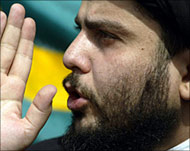Shia flock to Karbala amid clash fears
Hundreds of thousands of Shia thronged to the Iraqi city of Karbala to mark the holy day of Arbian amid fears of more fighting after the uprising by supporters of Shia leader Muqtada al-Sadr.

The Arbain commemoration, which began late on Saturday and continued on Sunday, falls 40 days after the day of Ashura. In March bombers detonated a series of deadly explosions, leaving 171 civilians killed.
Over the past week, members of al-Sadr’s al-Mahdi Army militia have battled occupation forces in Iraq, worsening fears of bloodshed during Arbain.
The peak of the Arbain commemoration-prayers before dawn- passed peacefully. But after daybreak the streets were still crowded with Shia, some of whom had walked for days from across Iraq to visit the Karbala shrine.
The day commemorates the death of Imam al-Husayn, grandson of the Prophet Muhammad, nearly 13 centuries ago in Karbala.
Al-Sadr’s militiamen have fought fierce clashes with Polish and Bulgarian occupation troops around Karbala during the past week. The battles have killed 69 people and wounded more than 100, said Mahdi Masnawi, Karbala director-general of health.
Fighting suspended
On the eve of Arbain, officials from al-Mahdi Army said they had reached agreement with al-Sadr to halt all fighting during the holy day.
 |
|
Turnout at the Karbala shrine was |
Inside the city, there were processions to the shrine of Imam al-Husayn, with men carrying mock tents and leading women in chains to re-enact the Shia tragedy of the death of al-Husayn.
Men and women wept and flagellated themselves.
The US-led administration in Iraq said more than a million people had headed to Karbala for Arbain. But fewer than expected made the journey.
Iraqi police, previously entrusted with keeping order during Arbain, were nowhere to be seen in Karbala after this week’s clashes.
Streets were being patrolled by al-Mahdi militiamen as well as local guards, some employed by the clerical authorities.
Low popularity
Few pilgrims chanted slogans in support of al-Sadr and his uprising. Al-Sadr, about 30-years-old, draws his main support from the Baghdad suburb of al-Sadr City and is less popular in Karbala.
In one street, where most windows were shattered and walls pockmarked with bullet holes after fighting with Polish troops, locals shoved away a man chanting his support for al-Sadr.
“Go away from here, we have women and children,” said one of the locals. “If you want to fight them, go fight them in your neighbourhood, don’t fight in our city.”
Battles between al-Sadr’s followers and foreign forces marked the first time a Shia group took up arms against the invading troops since the occupation.
Shia cooperation
Al-Sadr does not wield the same influence over Iraq’s Shia as the Iranian-born cleric Grand Ayat Allah Ali al-Sistani.
 |
|
Al-Sadr bases his religious |
So far, al-Sistani has ordered the Shia to cooperate with occupation forces.
Several members of the US-appointed Iraqi Governing Council (IGC) are negotiating with al-Sadr to end the fighting in the centre and south of the country, said a member of the council on Saturday.
Nasir al-Chadarji declined to give details of the talks, but said a deal would have to include al-Sadr’s renunciation of violence and a commitment by the occupation authorities to improve the lot of his mostly impoverished supporters.
No cleric
Al-Chadarji said that mostly Shia members of the 25-member council were talking to al-Sadr, along with tribal leaders and Shia religious establishment elders, but that al-Sadr had not yet committed to anything.
Since fighting erupted, Washington has vowed to destroy al-Sadr’s militia and to arrest him in connection with the murder of a rival Shia cleric in Najaf last year.
Italian forces destroyed al-Sadr’s office in the southern city of Nasiriya, reported Aljazeera’s correspondent.
An aide to al-Sadr said the leader was willing to start talks if foreign troops left Najaf, freed detained al-Sadr followers and ended the siege of the Sunni Muslim city of Falluja.
Al-Sadr is a son of the Grand Ayat Allah Muhammad Sadiq al-Sadr, a prominent Iraqi Shia leader who was killed in 1999 along with two of his other sons.
Hardly known outside Iraq, and lacking the religious education and degrees required by Shia doctrines, al-Sadr bases his religious authority on his lineage.